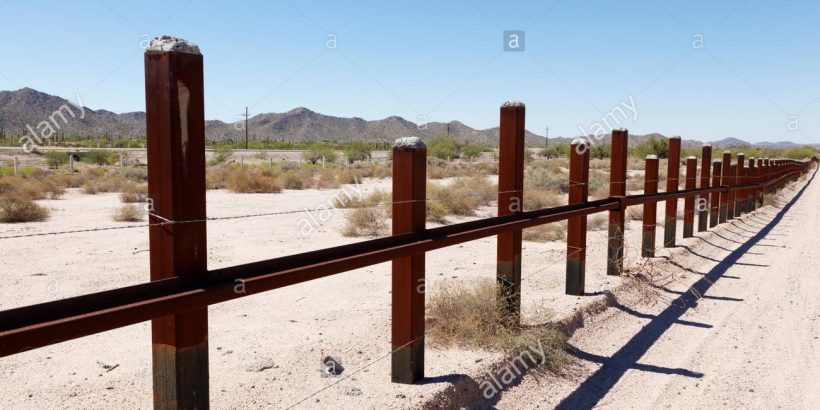High-speed vehicle pursuits of suspected human smugglers and other illegal immigrant-related crimes are becoming more common in Cochise County, Arizona, according to Sheriff Mark Dannels.
Dannels tracks illegal border crossings through his extensive hidden trail camera operation along his county’s 83 miles of shared border with Mexico.
The cameras showed 1,200 illegal entries in August 2020, and by December, it had more than doubled to 2,500, he said. Before August, 500 was a busy month.
“That’s what scares me about this whole thing,” he told The Epoch Times on Feb. 15. “Though I believe politics has no business in policing, it sure has an effect on the border.”
President Joe Biden has undone several border security measures that the Trump administration had put into effect, including temporarily suspending deportations of illegal aliens, reversing President Donald Trump’s ban on travel from terror-prone countries, halting border wall construction, and issuing a sweeping immigration package to Congress that includes amnesty for millions of illegal immigrants.
Biden has also pledged to bring in 25,000 asylum-seekers who are waiting in Mexico for their immigration case to be adjudicated under the Migrant Protection Protocols (MPP) program.
“The president’s view is that the approach of the prior administration was immoral, but also ineffective in terms of addressing the challenge—the many challenges of an outdated immigration system,” said White House press secretary Jen Psaki on Feb. 16.
However, Dannels says the “best border efforts we’ve ever had in the last three decades in Cochise County was over the last couple of years.”
“We had a president that was very tough on the border, nobody would question that. And now we’ve got a president who’s going to do just the opposite,” he said. “Are they rescinding them [executive orders] because it was Trump who was the author of it and it’s revengeful? Or are they rescinding it because it wasn’t working? I would question both those thoughts.”
Dannels said he’s concerned that border sheriffs are going to be sidelined during the Biden administration. He sits on the Homeland Security Advisory Council and was part of the Biden transition team for border issues. He was optimistic after the initial meeting about collaboration and other issues.
But he said he hasn’t been included in conversations about the impact of ending the MPP program, which he sees as one of the most effective policies.
On Feb. 19, the Department of Homeland Security will start to bring in 25,000 illegal immigrants who are part of the program.
“We’re going into Mexico during a health pandemic and bringing 25,000 over. It doesn’t make sense. It’s hypocritical,” Dannels said. “Either we’re in the middle of a health pandemic, or we’re not. Somebody in Washington, D.C., needs to make that decision.”
The message smugglers and cartels are receiving is that the border is “open for business,” and “that’s what’s scary to me,” Dannels said. Just last month, two illegal immigrants died when the vehicle they were in flipped as they tried to evade law enforcement. Another four people were in the vehicle.
“We need to have a secure border. The cartels are the only ones smiling right now, because they will benefit from this confusion,” he said.
He hopes the new administration’s measures won’t hamper the collaboration with local Border Patrol agents in Cochise County.
“We’re going to keep doing what’s right, what the oath of office has us to do—and that’s to protect our citizens,” he said.
But with the new policies, he said he’s “not optimistic” that a border crisis won’t emerge of similar proportions to what occurred in 2019. Almost 1 million illegal or inadmissible immigrants were apprehended by border agents along the southern border during fiscal 2019.
“We’re going to have our hands full [this year],” Dannels predicts.
“We’ve been down this road before. For 37 years, I’ve worked this southern border, and I’ve seen the different leadership come into Washington, D.C. They bring their own ideologies, their own policies, and unfortunately politics becomes the driving force of this.
“And what happens is, the local communities are the ones that take the impact.”

